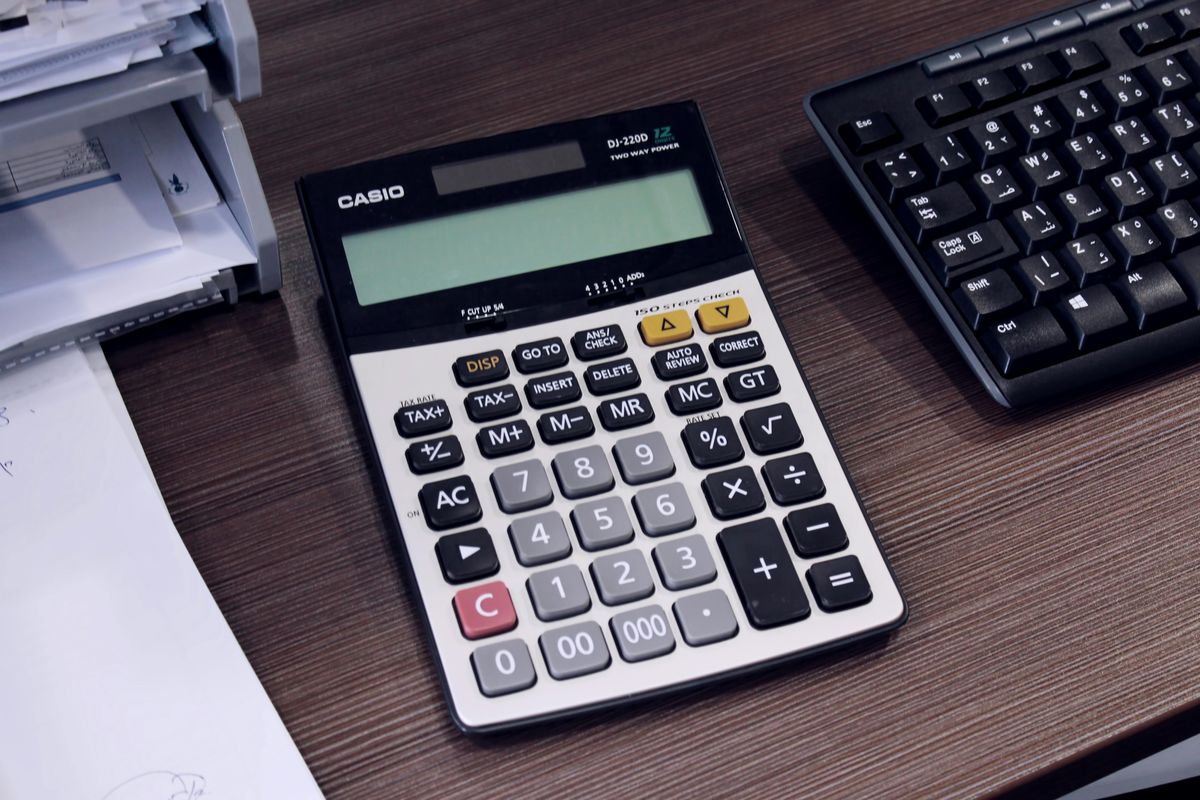In an era where financial stability and growth are paramount, mastering the personal finance calculator is a game-changer. This article, ‘Unlocking Your Financial Future: Mastering the Personal Finance Calculator,’ is designed to guide you through the intricacies of managing your finances using powerful spreadsheet tools like Google Sheets and Excel. Whether you’re planning for retirement, tracking your expenses, or setting up a family budget, our comprehensive guide will provide you with the knowledge and techniques to take control of your financial destiny.
Key Takeaways
- Personal finance management is crucial for budgeting, saving, and making informed financial decisions, which can be enhanced using spreadsheet tools.
- Google Sheets offers a range of basic to advanced features that can revolutionize the way you manage and analyze your personal finances.
- Excel is a powerful tool for creating a comprehensive personal finance system, allowing for detailed retirement planning and financial data tracking.
- Effective budgeting strategies, including personalized family budgets and practical budget tips, can significantly boost your savings and financial health.
- Mastering spreadsheet techniques for personal finance provides a structured approach to tracking income and expenses, leading to greater financial clarity and control.
The Fundamentals of Personal Finance Management


The Importance of Personal Finance Management
Understanding and efficiently managing your income, expenses, investments, and savings is the cornerstone of personal finance. It’s not just about ensuring you can cover your monthly bills, but also about securing your long-term financial well-being. By taking a proactive approach to personal finance, you can avoid debt, save for future goals, and make informed decisions that contribute to a stable financial future.
Effective personal finance management is a dynamic process that requires regular review and adjustment. It’s about identifying opportunities to improve your financial health and taking action to capitalize on them.
Personal finance management is a multifaceted discipline that involves more than just balancing a checkbook. It encompasses a range of activities, from budgeting and saving to investing and planning for the unexpected. Here’s a quick overview of the key components:
- Budgeting: Creating a plan for how you’ll spend your money each month.
- Saving: Setting aside funds for future needs or emergencies.
- Investing: Growing your wealth through strategic financial ventures.
- Planning: Preparing for short-term and long-term financial goals.
By mastering these components, you’re not just managing your money; you’re taking control of your financial destiny and paving the way for a secure future.
Key Components of Personal Finance
Personal finance management is a multifaceted discipline that requires attention to several key components. Understanding these components is crucial to mastering your financial landscape.
- Budgeting: Creating a plan for how you will spend your money each month.
- Income: The money you earn from work, investments, and other sources.
- Expenses: The money you spend on bills, groceries, entertainment, and other items.
- Savings: The portion of your income that you set aside for future use.
- Investing: Using your money to purchase assets with the potential for profitable returns.
- Protection: Ensuring you have the necessary insurance to safeguard your assets.
By integrating these components into a cohesive strategy, you can achieve a balanced financial life. It’s not just about how much you earn, but how you allocate and manage your resources that determines your financial well-being.
Financial Clarity and Decision Making
Achieving financial clarity is a pivotal step in personal finance management. It involves a thorough analysis of your financial situation, which allows for informed decision-making. By understanding where your money comes from and where it goes, you can identify opportunities for savings and make strategic choices about future investments.
- Review your income sources and monthly expenses
- Categorize your spending to pinpoint areas for improvement
- Set clear financial goals and establish a plan to reach them
- Regularly monitor your financial progress and adjust as needed
With a solid grasp of your financial picture, you can confidently navigate the complexities of personal finance and steer towards your goals. This proactive approach is essential for anyone looking to secure their financial future and avoid common pitfalls.
Remember, personal finance management is crucial for financial security. Financial literacy, education, emergency funds, budgeting, debt handling, and investing are key for long-term stability and wealth accumulation.
Harnessing the Power of Google Sheets for Financial Mastery


Introduction to Google Sheets
Google Sheets is a versatile platform that serves as an excellent starting point for anyone looking to take control of their personal finances. It provides a user-friendly interface and robust functionality that caters to both beginners and experienced users alike. With its web-based nature, Google Sheets ensures that your financial data is accessible from any device, offering the ultimate convenience for on-the-go management.
The basic features of Google Sheets are the bedrock upon which efficient personal finance management is built. Users can effortlessly create, edit, and format spreadsheets, inputting data and formulas with ease. Here’s a quick overview of some fundamental features:
- Data entry and basic formulas
- Cell formatting and styling
- Sorting and organizing data
For those who wish to delve deeper, Google Sheets comes equipped with advanced tools that can significantly enhance productivity and data analysis. Conditional formatting, data validation, pivot tables, and macros are just a few of the advanced features that can help you automate tasks and extract meaningful insights from your financial data.
By harnessing the power of Google Sheets, you can transform raw data into actionable financial strategies, ensuring that you are always one step ahead in your fiscal journey.
‘Visualizing Your Fiscal Path: A Redditor’s Guide to the Personal Finance Flowchart’ is an excellent resource that provides a roadmap for managing finances, covering budgeting, investments, and financial tools for stability and growth. This guide can complement the capabilities of Google Sheets, allowing you to visualize and plan your financial future with greater clarity.
Basic and Advanced Tools for Personal Finance
Google Sheets offers a versatile platform for managing your personal finances, from the basic features to more sophisticated tools. Beginners can start with simple tasks like recording transactions and creating budgets. As you become more comfortable, you can explore advanced functionalities such as pivot tables and complex formulas for deeper financial analysis.
To effectively harness these tools, it’s essential to understand their applications:
- Budgeting: Structuring your income and expenses to plan for future savings.
- Tracking: Monitoring income and expenses to identify spending patterns.
- Goal Setting: Defining financial objectives and measuring progress.
- Investing: Analyzing investment opportunities and tracking portfolio performance.
- Data Analysis: Interpreting financial data to make informed decisions.
By mastering these tools, you can achieve a comprehensive overview of your financial health and make strategic decisions to reach your goals.
Remember, the key to maximizing your personal finance with Google Sheets is to start with the basics and gradually incorporate more complex features as your skills improve. This approach ensures a solid foundation and a scalable system for your financial management needs.
Maximizing Your Personal Finance with Google Sheets
Google Sheets has revolutionized the way we manage our finances, offering a suite of tools that can transform your approach to personal finance. By harnessing the power of Google Sheets, you can gain unparalleled insights into your financial health and make informed decisions.
To begin, set up a basic structure for tracking your income and expenses. Here’s a simple table to get you started:
| Date | Description | Income | Expense |
|---|---|---|---|
| 2023-04-01 | Salary | $3000 | |
| 2023-04-03 | Groceries | $150 |
With a Google Sheets budget template, you can easily manage your money and achieve your financial goals. The templates provided by Google Sheets simplify the process, allowing you to focus on what matters most.
As you become more familiar with Google Sheets, you can explore advanced features such as pivot tables, data validation, and conditional formatting to further enhance your financial management. Remember, the key to maximizing your personal finance is not just about tracking numbers but also about understanding the story they tell.
Creating a Personal Finance System with Excel


Mastering Personal Finance with Excel: A Comprehensive Guide
Excel is a powerful tool for managing your personal finances. By mastering Excel, you can create a customized budget that fits your unique financial situation. Start by setting up your categories for income and expenses. Then, input your monthly figures to track your financial health over time.
To ensure accuracy and ease of use, familiarize yourself with essential Excel formulas. These formulas can automate calculations, such as summing up your total expenses or calculating the difference between your income and spending. Here’s a simple table to help you get started:
| Category | Estimated | Actual | Difference |
|---|---|---|---|
| Income | $5000 | $5200 | $200 |
| Rent | $1500 | $1500 | $0 |
| Groceries | $300 | $350 | -$50 |
| Utilities | $250 | $245 | $5 |
By consistently updating and reviewing your Excel budget, you can identify areas where you can cut costs and increase savings. This proactive approach to personal finance can lead to significant improvements in your financial future.
Remember, the key to mastering personal finance with Excel is not just about tracking numbers; it’s about making informed decisions that align with your financial goals. Utilize the power of Excel to gain financial clarity and take control of your future.
Maximize Your Retirement Planning with Excel
Excel is a powerful tool for retirement planning, offering a range of features that can help you forecast your financial future. By using Excel’s built-in functions, you can create a detailed retirement plan that accounts for your current savings, expected rate of return, and desired retirement age.
With Excel, you can simulate different scenarios to see how changes in savings rates or investment returns might affect your retirement goals.
Here’s a simple table to help you start planning:
| Year | Age | Current Savings | Annual Contribution | Expected Return |
|---|---|---|---|---|
| 2023 | 30 | $50,000 | $6,000 | 5% |
| 2024 | 31 | $56,300 | $6,000 | 5% |
| … | … | … | … | … |
Remember to adjust the figures according to your personal situation and goals. By mastering personal finance with Excel, you can take a proactive approach to securing your financial future.
Tracking and Analyzing Your Financial Data
Once you’ve diligently logged your income and expenses, the next step is to analyze your financial data to uncover valuable insights. Google Sheets serves as a powerful tool for this purpose, offering a range of formulas and features to help you understand your financial health.
To start, categorize your expenses and income sources. This will allow you to identify trends and areas for potential savings. For example, you might notice a high percentage of your budget going towards dining out, suggesting an opportunity to cut back.
Here’s a simple table to help you visualize your monthly spending categories:
| Category | Amount |
|---|---|
| Groceries | $500 |
| Rent | $1200 |
| Dining Out | $300 |
| Utilities | $250 |
| Entertainment | $150 |
By consistently tracking and analyzing your financial data, you can make informed decisions that lead to better financial management and future planning.
Remember, personal finance is not just about recording numbers; it’s about understanding the story they tell. Use the tools at your disposal to demystify your finances and take control of your financial future.
Budgeting Strategies to Enhance Your Savings


The Ultimate Guide to Family Budgets
Creating a family budget is a critical step in ensuring financial stability and achieving your savings goals. A well-structured budget allows you to oversee your income and expenses, making it easier to plan for the future.
To start, categorize your expenses into essential and non-essential items. Here’s a simple breakdown:
| Category | Essential | Non-Essential |
|---|---|---|
| Housing | Yes | No |
| Utilities | Yes | No |
| Groceries | Yes | No |
| Entertainment | No | Yes |
| Dining Out | No | Yes |
| Subscriptions | No | Yes |
By distinguishing between needs and wants, you can allocate funds more effectively and identify areas where you can cut back.
Remember, the key to a successful family budget is flexibility and regular review. Adjust your budget as needed to reflect changes in income or expenses, ensuring that it remains a useful tool for your financial journey.
10 Personal Budget Tips and Tricks to Help You Save More Money
Saving money can often feel like a challenge, but with the right strategies in place, it’s entirely achievable. Start by tracking your expenses to understand where your money goes each month. This simple act can illuminate spending habits and help you identify areas for improvement.
- Create a realistic budget that aligns with your financial goals and stick to it.
- Prioritize building an emergency fund; it’s your financial safety net.
- Cut unnecessary expenses and consider using cash or debit cards to limit overspending.
- Automate your savings to ensure you consistently set money aside.
Embrace the habit of regular financial reviews. This will help you stay on track and make necessary adjustments to your budget and savings plan.
Remember, the key to saving more money is not just about cutting costs, but also about making smart financial decisions and investing in your future. Learning personal finance basics and seeking resources like podcasts and online classes can provide valuable insights and control your finances effectively.
Increasing Your Income and Managing Expenses
To truly enhance your financial well-being, increasing your income is just as crucial as managing expenses. Exploring side hustles or negotiating better pay can lead to significant improvements in your financial landscape.
Creating a budget that aligns with personal goals is a foundational step towards financial control and savings. It’s not just about cutting costs, but also about making informed decisions that can yield a substantial lifetime benefit.
Here’s a simple way to start tracking your income and expenses using a spreadsheet:
- Record all sources of income, including your main job, side gigs, and passive income streams.
- Log every expense, categorizing them to understand where your money goes.
- Utilize formulas to analyze your spending patterns and identify areas for improvement.
- Visualize your data with charts to get a clear picture of your financial health over time.
By consistently monitoring your financial data, you can make adjustments that lead to a more secure future. Remember, financial education and informed decision-making are key to effective debt management and long-term savings.
Advanced Personal Finance Techniques Using Spreadsheets


Mastering Personal Finance with Spreadsheets
Spreadsheets are a cornerstone of personal finance management. They offer a flexible and powerful tool to track and analyze your financial data. By mastering spreadsheets, you can gain a comprehensive view of your financial health and make informed decisions.
To begin, set up your spreadsheet with categories that reflect your income and expenses. This might include salary, rent, groceries, and utilities. Here’s an example of how to structure your data:
| Category | Description | Amount |
|---|---|---|
| Income | Salary | $5000 |
| Expense | Rent | $1500 |
| Expense | Groceries | $300 |
| Expense | Utilities | $250 |
Customizing your spreadsheet allows for a personalized approach to finance management. Utilize features like conditional formatting and pivot tables to highlight trends and summarize data.
Remember, a budget spreadsheet is cost-effective and simplifies the management of your finances. Follow a structured approach to build a robust financial spreadsheet that caters to your unique needs.
Setting Up Your Personal Finance Spreadsheet
Creating a well-organized and customized spreadsheet is crucial for effective personal finance management. To get started, open your spreadsheet application and create a new file. Give it a descriptive title, such as ‘Personal Finance Tracker.’
Set up your columns with headings like ‘Income’, ‘Expenses’, ‘Date’, and ‘Description’. Here’s a simple structure to follow:
| Date | Description | Income | Expenses |
|---|---|---|---|
| 2023-04-01 | Salary | $3000 | |
| 2023-04-02 | Groceries | $150 |
Customizing your spreadsheet with colors, fonts, and cell formatting can significantly improve readability and ease of use. Consider creating separate sheets for different financial aspects, such as budgeting, savings, and investments, to keep your data organized.
By meticulously tracking your income and expenses, you can gain valuable insights into your financial habits and make informed decisions to enhance your financial well-being.
Tracking Your Income and Expenses
Keeping a meticulous record of your income and expenses is essential for a clear financial picture. Create a dedicated section in your spreadsheet for each type of transaction. For income, include details such as the date, source, and amount. Expenses should be logged with the date, category, description, and amount. This structured approach not only simplifies tracking but also prepares you for deeper financial analysis.
By categorizing your expenses, you gain valuable insights into your spending habits, empowering you to make strategic budget adjustments.
Here’s an example of how to structure your income and expenses in a simple table:
| Date | Source/Category | Description | Income | Expenses |
|---|---|---|---|---|
| 2023-04-01 | Salary | April Paycheck | $3000 | |
| 2023-04-02 | Groceries | Weekly Food Supply | $150 |
Regularly updating and reviewing your spreadsheet will help you stay on top of your finances and identify areas for improvement. Use formulas to automatically calculate totals and employ conditional formatting to highlight anomalies or important figures.
Conclusion
Mastering the personal finance calculator is a crucial step towards achieving financial clarity and independence. By leveraging tools like Google Sheets and Excel, you can organize your financial data, track your income and expenses, and plan for the future with precision. Whether you’re setting up your first budget spreadsheet, optimizing your retirement planning, or seeking ways to increase your income, the knowledge you’ve gained from this article will serve as a powerful ally in your journey to financial mastery. Remember, the path to financial freedom begins with informed decisions and disciplined habits. Embrace the power of personal finance calculators, and unlock your financial future.
Frequently Asked Questions
How can mastering Google Sheet formulas improve my personal finance management?
Mastering Google Sheet formulas can revolutionize your personal finance management by automating calculations, tracking expenses, and visualizing financial data, helping you make informed decisions and achieve your financial goals.
What are the key components of personal finance that I should focus on?
The key components of personal finance include budgeting, saving, investing, managing debt, and planning for retirement. Focusing on these areas helps ensure a balanced approach to financial health.
Is it necessary to have advanced Excel skills to manage my personal finances effectively?
While advanced Excel skills can enhance your ability to analyze and manage your finances, basic skills combined with a comprehensive guide can also help you effectively control your financial future.
Can setting up a personal finance spreadsheet help me save more money?
Yes, setting up a personal finance spreadsheet can help you track your income and expenses, identify areas where you can cut costs, and plan for savings, ultimately helping you save more money.
What are some strategies to increase my income and manage expenses better?
Strategies to increase income include seeking higher-paying jobs, developing new skills, or starting a side business. Managing expenses better can involve budgeting, eliminating unnecessary purchases, and negotiating bills.
How can I use spreadsheets to maximize my retirement planning?
Spreadsheets can be used to project retirement savings, calculate future expenses, and create a withdrawal strategy. This allows for a detailed and adaptable approach to retirement planning.





